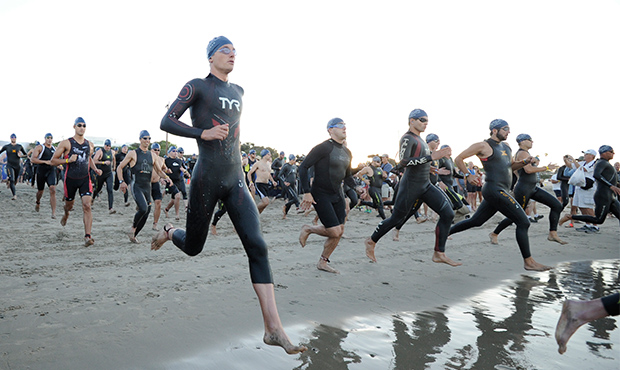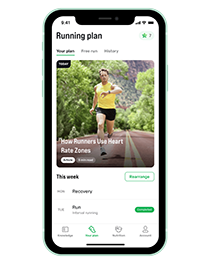
By clicking on the product links in this article, we may receive a commission fee at no cost to you, the reader. Sponsorships and affiliate commissions help support our research so we can help you find the best products. Read our full affiliate disclosure here.
Not every athlete is out to win, but everyone is out to finish. And whether you admit it or not, everyone secretly wants to do better than their competitors and see improvement race after race, year after year.
As with most endurance sports, triathlon training plans employ a technique called periodization--a cyclic training plan an athlete puts into practice over a certain period. The goal of periodization is to reach peak performance when race day arrives.
This beginner's plan was created specifically for the classic distance race at the 2016 Nautica Malibu Triathlon presented by Equinox, which includes a half-mile ocean swim, an 18-mile bike segment and a four-mile run. This program assumes you have limited multisport experience and you're beginning your training straight off the couch.
JOGGO Running App helps you reach your running goals faster with personalized training and nutrition:
The plan breaks down into three basic segments:
Base: The first few weeks of the program focuses on muscle and movement prep and includes limited growth in volume or intensity.
Build: The "meat" of a training plan focuses on weekly increases in volume, endurance and generating power over distance. It also includes recovery weeks, where volume drops approximately 40 to 50 percent, yet intensity may increase.
Although this cycle can vary depending on the race distance, coach and especially the athlete, the goal is essentially the same: Stress the body into adaptation and growth. Recovery weeks allow for extra rest and replenishment, allowing the body to repair and get stronger.
Race Prep and Taper: This segment includes the final few weeks leading up to your race. The volume will begin to decrease as the focus shifts to final race preparations. The taper is the final week(s) leading up to the race, when volume significantly decreases.
Triathlon training plans also focus on specificity. Multisport racing offers a wide range of challenges that require specific training for optimal performance.
Open water race swims often require athletes to run through crashing surf, battle choppy water and then fight the crashing surf again on the way back to the beach. Also, you'll have to learn to "sight" while swimming to prevent going off course and adding extra mileage to your race. Adding hard effort laps to your practice swim can help you prepare for the rush of a triathlon swim start.
One of the most important training elements of a triathlon plan is the brick, or bike-to-run workout. The transition from cycling to running can be very jarring—and as any triathlete will tell you, incredibly uncomfortable. To account for this, we introduce brick workouts early in the training plan.
Through these series of stresses (volume, intensity and recovery), you'll slowly inch your way up to race distances and have trained your body to not only recognize the discomfort, but also better manage it.
| 12 WEEK CLASSIC DISTANCE BEGINNER TRIATHLON TRAINING PROGRAM | |||||
| Start with three workouts each week (1 per discipline) | |||||
|
| Brick = Bike / Run Combination |
| |||
|
| Open Water Swims can be done before BRick workout or as 5th Day |
| |||
|
|
| *Consider the MESP Practice Swims |
| ||
|
| DAY 1 | DAY 2 | DAY 3 | DAY 4 | DAY 5 |
| WEEK 1 | SWIM 600yds | BIKE | RUN |
|
|
| WEEK 2 | SWIM 700yds | BIKE | RUN |
|
|
| WEEK 3 | SWIM 800yds | BIKE | RUN |
|
|
| WEEK 4 | SWIM 1000yds | BIKE | RUN | BRick |
|
| WEEK 5 | SWIM 800yds | BIKE Recovery Day | RUN | BRick |
|
| WEEK 6 | SWIM 1000yds | BIKE | RUN | BRick |
|
| WEEK 7 | SWIM 1200yds | BIKE | RUN | BRick |
|
| WEEK 8 | SWIM 1500yds | BIKE | RUN | BRick | Open Water Swim* |
| WEEK 9 | SWIM 800yds | BIKE | RUN |
|
|
| WEEK 10 | SWIM 1500yds | BIKE | RUN | BRick | Open Water Swim* |
| WEEK 11 | SWIM 1600yds | BIKE | RUN | BRick | Open Water Swim* |
| WEEK 12 | SWIM 800yds | BIKE | RUN 2 miles | RACE DAY! |
|
Jason Schneider is an Equinox Trainer, 4x IRONMAN and founder and head coach for TriTrain Endurance Coaching.









Discuss This Article